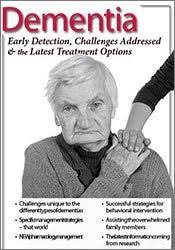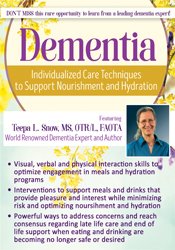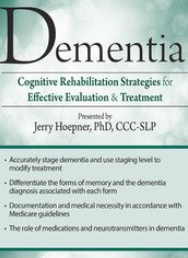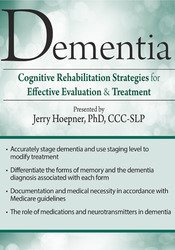What You’ll Discover in Teepa L. Snow Dementia
Available for purchase. This course is available to you.
Teepa L. Snow – Dementia
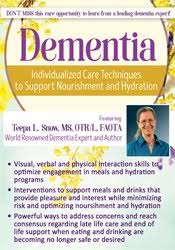
- Dementia’s Effect on Appetite, Nutrition, Hydration, Meal Preparation and Eating
- Our relationship to food, drink, meal preparation, and eating from multiple angles:
- Cultural
- Spiritual
- Social
- Emotional
- Individual
- Physical
- Sensory
- Physiological
- The value and meaning of food or drink can influence how people eat and what they eat.
- Assessment tools for personalizing behavioral interventions
- Our relationship to food, drink, meal preparation, and eating from multiple angles:
- Impact Dementia The Brain Function Changes
- Screen for auditory, visual and sensory-Motor, olfactory, and gustatory sensory intake
- Different stages of dementia can cause changes in the processing system
- Cognitive skill alterations that impact independence, interest, and engagement
- Time awareness
- Situational awareness
- Problem solving
- Sequencing
- Memory
- Language processing
- Impulse control
- Ability-based and Cognitive Disability Evaluation Tool – GEMS® Model
- This framework provides a common language to help you modify your expectations and create new environments.
- Diamond in the Early Stage
- Moderate Stage (Emerald)
- Moderately Severe (Amber).
- Severe Stage (Rubies)
- Extreme Stage (Pearls).
- This framework provides a common language to help you modify your expectations and create new environments.
- How to develop skills that optimize success in nutrition and hydration
- Structured initiating is used to encourage active participation and limit the number of refusals
- Verbal statements that promote self-choice and choice-Direction and task initiating
- Cueing sequences with graded options for each GEMS® state
- Assist with automatic reactions, reflexes, and focus attention
- Reduce distractions and passive eating behaviors
- Strategies to Improve Nourishment, Hydration and Performance in the Early- to Late Stage
- Guide meal selection, settings and routines in combination with each GEMS® state
- Refusals, adverse reactions, excess or under-eating or drinking should be limited
- Optimize performance with cues, routines communication, interaction and communication skills
- Social, physical, or sensory environmental features that can foster or inhibit optimal function
- Environment settings/situations that address potential areas of concern
- You can create personalized care programs that provide you with the best support
- Members of a Support Team: The roles of each person/discipline
- It’s ending: Food and Drink are the Role
- Typically, signs of the end of life include changes in physical, psychological, and physiological parameters.
- The development of interaction skills to support:
- Personal beliefs about life-sustaining measures
- Personal choice
- Offer versus push
- The value and meaning of food & drink
- Eating by the mouth rather than artificial nourishment and hydration
- Differentiating between inability to comprehend the offer of food and drink, or lack of ability to use it.
- Techniques and strategies that don’t make nourishment or hydration the primary goal
Would you like a gift? Teepa L. Snow – Dementia ?
Description:
The world’s foremost dementia expert and author is on-screen. Teepa L. Snow, MS, OTR/L, FAOTA, for this engaging workshop as you explore the depth and breadth of change that various forms of dementia have on the person’s interest in and ability to consume food and drink—for enjoyment and survival. You will be able to learn how to design and implement programs to help your client optimize their remaining abilities and capabilities while recognizing and accepting the limitations of this neurodegenerative condition.
This research draws on more than 30 years of clinical experience with dementia and research. Teepa Practical and practical strategies and techniques will be taught to maximize functionality, engagement, safety and performance. You will leave with the ability to screen and assess, modify programming, and perform other tasks.-based cueing and assistance from first symptoms to end of the life considerations, and will be able to make a positive and valuable difference in the lives of people living with dementia whether—
- Guide in early stages of food and beverage preparation
- Supported intake and item selection in the mid-level-The stages
- offering moisture and tastes for sensory satisfaction only at life’s end.
IMPORTANT: This is the entire “Teepa L. Snow – Dementia” It is totally Download Available Check your account
(If a link is not working, we will quickly renew it.
Your patience is greatly appreciated.


